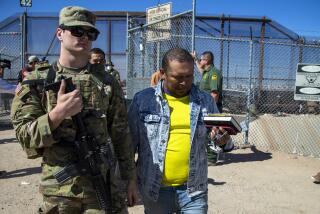Call It a Day for U.S. Troops in Bosnia
- Share via
Our mission is clear, limited in time and with robust rules of engagement,” or so U.S. Gen. George Joulwan told the Associated Press on Dec. 16, 1995, as he prepared to lead NATO forces in their Bosnia peacekeeping mission. The mission was scheduled to last one year. Now we’re heading into the third year. As many of the soldiers, sailors, airmen and Marines deployed in and around the Balkans can attest, President Clinton’s Bosnia mission has been anything but clear or limited.
As one who cradled dying Marines in my arms in the faraway jungles of Vietnam, I’m convinced that it’s time to end the Balkans quagmire. If the Clinton administration won’t do it, then Congress must act to bring our troops home.
On Dec. 2, representatives of the 16-nation NATO alliance met to discuss, among other items, the possibility of keeping NATO forces in Bosnia past the current deadline of June 1998. The Clinton administration has already made it clear that it would like U.S. forces to remain well into June, with possible extensions to follow.
The U.S. troops currently in Bosnia also have been asked to conduct a manhunt for war criminals. This is a dramatic repetition of mistakes made in Somalia. The mission creep and the potential escalation of a military mission without popular support back home poses an unacceptable threat to such “nation-building” missions.
The desire to bring stability to the Balkans and ensure that war criminals are brought to justice is understandable. However, U.S. decision-makers must not equate the war criminals of the former Yugoslavia with those of Nazi Germany. While their crimes may well be heinous, bringing Balkan butchers to justice is not a simple feat. Absent the political will of local governing authorities, or the power of a victorious occupying force, assigning American GIs the task of apprehending these thugs could well become a “mission impossible.”
Worse yet, requiring U.S. troops to serve as police in the Balkans not only invites needless casualties in a dubious cause, it also suggests such use elsewhere.
The hard facts of the matter are that while our soldiers are the best in the world at completing a military mission, they are neither trained nor equipped to undertake such “law enforcement” missions. There are currently more than 60 spots around the world where there is constant political unrest and disorder. How can the U.S. military, especially after the drastic Clinton administration defense cuts, be expected to intervene in them all? Should our troops move into Congo and Rwanda to apprehend the practitioners of genocide there as well?
Before this futile endeavor is further complicated, before the mission is further expanded, before another American casualty, Congress should:
* Exact a written guarantee that all U. S. troops will be out of the Balkans by June 1998;
* Require that the administration immediately commence a phased withdrawal of U.S. units;
* Require the administration to present a written mission summary and exit strategy to Congress prior to any further deployment of U.S. forces to the region in accordance with a North Atlantic Command mission.
* Require that the administration comply with these criteria by refusing to fund the Balkans mission beyond June 1998.
Congress cannot trust Clinton’s assurance that American troops will be out of Bosnia by June. His word simply does not meet the test of time. This is, after all, the same commander in chief who at the end of last year’s deadline for withdrawal ordered the Bosnia mission to creep on for another 18 months.
The failure to verify this administration’s word has cost us dearly. Lives have been lost. Readiness has been degraded. Scarce resources have been squandered.
In the face of the president’s ambiguous and confused Bosnia policy, it is up to Congress to bring some clarity to the situation. Such congressional action will send a message to the international community that demonstrates a U.S. interest to help but not to engage in any long-term police action. This is a much needed message to our allies around the globe and especially our European friends.
More to Read
Get the L.A. Times Politics newsletter
Deeply reported insights into legislation, politics and policy from Sacramento, Washington and beyond. In your inbox twice per week.
You may occasionally receive promotional content from the Los Angeles Times.








